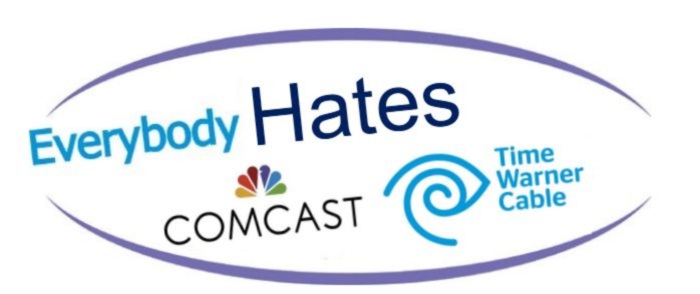According to the latest survey by American Customer Satisfaction Index, by far the biggest (and often most accurate) study in the country, cable providers Comcast and Time Warner Cable have the lowest customer satisfaction ratings of all companies . . . in all industries . . . in all of America.

And that’s not even the bad news: Comcast and Time Warner Cable were the only two companies to score below a 60 on the ACSI’s 100-point scale. They’re lower than perennial customer satisfaction basement dwellers United Airlines, Bank of America, Sprint, Aetna — even the Los Angeles Department of Water and Power scored a higher customer satisfaction rating.
In the report, the ACSI states that the low satisfaction ratings for Comcast and Time Warner Cable should make the two companies reconsider their upcoming merge, which would quickly make them the largest content provider in the American broadband and pay TV markets.
“The combination of low and downward-trending customer satisfaction for both Comcast and Time Warner Cable is cause for concern amid merger talks between the two companies,” ACSI writes. “The issue at stake is not that the proposed merger will limit competition as the service territories of the two companies do not overlap. Instead, it is the question of whether a combination of two pay-TV providers with such poor records could possibly create a better customer experience, especially given the volume of evidence from ACSI data suggesting that mergers in service industries tend to damage satisfaction — at least in the short term.”
In all likelihood, the results of this survey will play no part in the two companies finalizing their deal.
“Comcast and Time Warner assert their proposed merger will not reduce competition because there is little overlap in their service territories,” says David VanAmburg, ACSI Director. “Still, it’s a concern whenever two poor-performing service providers combine operations. ACSI data consistently show that mergers in service industries usually result in lower customer satisfaction, at least in the short term. It’s hard to see how combining two negatives will be a positive for consumers.”
Worth pointing out is the effect the Internet has had on how customers now view their television subscriptions.
“The Internet has been a disruptor for many industries, and subscription TV and ISPs are no exception,” says Claes Fornell, ACSI Chairman and founder. “Over-the-top video services, like Netflix and Hulu, threaten subscription TV providers and also put pressure on ISP network infrastructure. Customers question the value proposition of both, as consumers pay for more than they need in terms of subscription TV and get less than they want in terms of Internet speeds and reliability.”
Also worth noting from the study is that Samsung has now surpassed Apple as America’s favorite cell phone maker. The company earned an all-time high ACSI score of 81, while Apple fell for the second year in a row, this time by 2%, to a score of 79. Should Apple fall out of the top two is a serious concern, as the field is getting tight — Motorola Mobility and Nokia (Microsoft) both scored 77, respectively, and despite the PR nightmare they’ve had to go through this past year, let alone the fact that most of their market has pretty much disappeared, BlackBerry’s satisfaction rating rose 7% to a score of 74.
“Samsung has gone from up-and-comer to top-of-the-heap on the strength of its smartphone portfolio,” says VanAmburg. “Apple’s magic isn’t gone, but the luster has dulled on its older models. Each iteration improves on the last, but Apple’s year-long product refresh cycle is an eternity when a new Android phone seems to be released every week.”
As long as we’re on the topic of smartphones, Verizon Wireless has the highest customer satisfaction rating this year, climbing 3% to 75. Following suit are T-Mobile (69), Sprint (68), and AT&T Mobility (68).
“Consumers once used their cell phones primarily for talking, whereas now smartphones are becoming lifestyle accessories that we just can’t live without,” says Fornell. “But these powerful devices rely on networks that are still playing catch-up with consumer demand.”
Story via bgr.com
Advertisement





